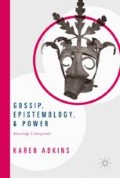Abstract
This chapter summarizes the book, argues for a single, consistent standard around the use and identification of gossip, and suggests social practices that facilitate good gossip.
Access this chapter
Tax calculation will be finalised at checkout
Purchases are for personal use only
Works Cited
Alcoff, Linda. 2003. Introduction. In Singing in the Fire: Stories of Women in Philosophy, ed. Linda Alcoff. Lanham, MD: Rowman & Littlefield.
Baker, C. Edwin. 2004. Autonomy and Informational Privacy, or Gossip: The Central Meaning of the First Amendment. Social Philosophy and Policy 21 (2): 215–268.
Ball, Erica L. 2014. ‘Gadding,’ ‘Gainsaying,’ and Negotiating Gossip in the Antebellum Black Press. In When Private Talk Goes Public: Gossip in American History, ed. Kathleen A. Feeley and Jennifer Frost, 101–121. New York: Palgrave.
Bordia, Prashant, Kohyar Kiazard, Dimon Lloyd Retubog, Nicholas DiFonzo, Nicholas Stevenson, and Robert L. Tang. 2014. Rumor as Revenge in the Workplace. Group & Organization Management 39: 363–388.
Clancy, Kathryn B.H., Robin G. Nelson, Julienne N. Rutherford, and Katie Hinde. 2014. Survey of Academic Field Experiences (SAFE): Trainees Report Harassment and Assault. PLOS One 9: 7 (July 16). http://journals.plos.org/plosone/article?id=10.1371/journal.pone.0102172. Accessed 28 Jan 2016.
Coady, David. 2012. What to Believe Now: Applying Epistemology to Contemporary Issues. New York: Wiley-Blackwell.
Fertik, Michael, and David C. Thompson. 2015. The Reputation Economy: How to Optimize Your Digital Footprint in a World Where Your Reputation is Your Most Valuable Asset. New York: Crown Business.
“Gossiping About Gossip.” 1986. Harper’s, 272 (1628): 37–49.
Grosser, Travis J., Virginie Lopez-Kidwell, and Giuseppe Labianca. 2010. A Social Network Analysis of Positive and Negative Gossip in Organizational Life. Group & Organization Management 35 (2): 177–212.
Horodowich, Elizabeth. 2008. Language and Statecraft in Early Modern Venice. Cambridge: Cambridge University Press.
———. 2014. Rumour, Newsletters, and the Pope’s Death in Early Modern Rome. In News in Early Modern Europe: Currents and Connections, ed. Simon F. Davies and Puck Fletcher, 143–158. Leiden: Brill.
Kniffin, Kevin M., and David Sloan Wilson. 2010. Evolutionary Perspectives on Workplace Gossip: Why and How Gossip Can Serve Groups. Group & Organization Management 35 (2): 150–176.
Overbye, Dennis. 2015. Geoffrey Marcy to Resign from Berkeley Astronomy Department. The New York Times, October 14. http://www.nytimes.com/2015/10/15/science/geoffrey-marcy-to-resign-from-berkeley-astronomy-department.html
Phillips, Susan E. 2007. Transforming Talk: The Problem with Gossip in Late Medieval England. University Park: Penn State University Press.
Putnam, Robert. 2000. Bowling Alone: The Collapse and Revival of American Community. New York: Simon and Schuster.
Radzik, Linda. 2016. Gossip and Social Punishment. Res Philosophica 93 (1): 185–204.
Richey, Christina R., Kathryn B.H. Clancy, Katharine M. Lee, and Erica Rogers. 2015. The CSWA Survey on Workplace Climate and an Uncomfortable Conversation about Harassment. Division for Planetary Sciences 47 Conference, National Harbor. November 8–13. http://data.boulder.swri.edu/ksinger/Richey_2015_DPS_Masursky_Talk.pdf. Accessed 28 Jan 2016.
Waddington, Kathryn. 2012. Gossip and Organizations. New York: Routledge.
Webb, Mark. 2004. Can Epistemology Help? The Problem of the Kentucky-Fried Rats. Social Epistemology 18 (1): 51–58.
Weinberg, Justin. 2015. Some Upcoming Changes to Daily Nous. Daily Nous, December 17. http://dailynous.com/2015/12/17/some-upcoming-changes-to-daily-nous/. Accessed 11 Jan 2016.
White, Patricia. 2013. A Philosophical Look at Gossip. Can Democratic Institutions of Higher Education Do Without It? Philosophy of Education Society of Great Britain Conference, New College, Oxford, March 22–24.
Wiessner, Polly. 2005. Norm Enforcement Among the Ju/‘hoansi Bushmen: A Case of Strong Reciprocity? Human Nature 16 (2): 115–145.
Yalom, Marilyn. 2015. with Theresa Donovan Brown. The Social Sex: A History of Female Friendship. New York: Harper Perennial.
Author information
Authors and Affiliations
Rights and permissions
Copyright information
© 2017 The Author(s)
About this chapter
Cite this chapter
Adkins, K. (2017). Conclusion: Schools for Scandal. In: Gossip, Epistemology, and Power . Palgrave Macmillan, Cham. https://doi.org/10.1007/978-3-319-47840-1_8
Download citation
DOI: https://doi.org/10.1007/978-3-319-47840-1_8
Published:
Publisher Name: Palgrave Macmillan, Cham
Print ISBN: 978-3-319-47839-5
Online ISBN: 978-3-319-47840-1
eBook Packages: Religion and PhilosophyPhilosophy and Religion (R0)

